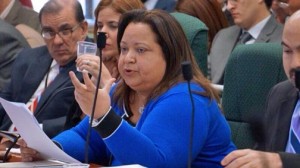Administration files bill to shore up HTA’s finances

Government Development Bank President Melba Acosta announced Thursday the filing of legislation containing measures to improve the fiscal and financial situation of the Puerto Rico Highways and Transportation Authority.
The bill is expected to provide funding to operate Puerto Rico’s highways network, protect thousands of public and private jobs, and continue to provide maintenance to the road network, the Urban Train operation, and the bus and ferry services.
Acosta explained that the bill adjusts the excise tax on the barrel of crude oil to $15.50 per barrel. This tax is expected to generate an additional $178 million per year. The taxes would be distributed as follows: $6 per barrel for the PRHTA to cover its operational costs and debt service obligations, $8.25 per barrel for the Puerto Rico Infrastructure Financing Authority to cover debt service, and $1.25 per barrel to finance the new Integrated Transportation Authority, which comprises the Metropolitan Bus Authority bus services, the ferry services (Maritime Transportation Authority) and the Urban Train system, once their transferred is completed.
The law would become effective immediately after its approval; provided, however, that the adjustments in the excise tax on crude oil and its by-products will be implemented beginning on March 1, 2015.
“Our administration is committed to fiscal responsibility and this is yet another step forward on our path to economic recovery for our [island.] With these measures we will stabilize the finances of the PRHTA, which has been operating with budget deficits for the last 10 years,” she said.
“In addition, this provides funding to address the debt of the PRHTA with the GDB, which has ballooned by more than $2 billion over the last six years. And, most importantly, this bill will bring great benefits to our people: it allows for job creation, particularly in the construction industry, and protects existing jobs; it will enable the development of pending projects in the mountainous zones and isolated areas; we will be able to set in motion maintenance projects for the road network, improve accesses to avenues and expressways, make infrastructure improvements that will result in reductions in road accidents, and reduce traffic jams, among others,” she added.
Meanwhile, PRHTA executive director Javier Ramos-Hernández added that not adopting these measures could “seriously affect our development as an [island] due to lack of a first-rate infrastructure and would put us at risk of losing millions of dollars in federal funds if PRHTA loses its “grantee” status with the Federal Highway Administration (FHWA) and the Federal Transit Administration.
The measure filed Thursday explicitly excludes the taxation of crude oil and its by products used by the Puerto Rico Electric Power Authority to generate electricity, as well as those that are exported from Puerto Rico; those used by local refineries and petrochemical companies in the oil refining process; and those used as lubricants or fuel for aircrafts and shipping vessels travelling by air or sea between Puerto Rico and other places; among other exclusions.







